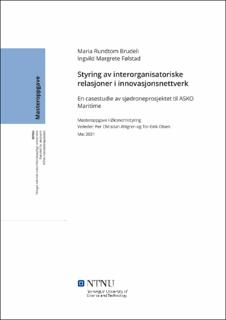Styring av interorganisatoriske relasjoner i innovasjonsnettverk
Master thesis
Permanent lenke
https://hdl.handle.net/11250/2780539Utgivelsesdato
2021Metadata
Vis full innførselSamlinger
- NTNU Handelshøyskolen [1623]
Sammendrag
Vi har i denne masteroppgaven gjennomført en casestudie av samarbeidet mellom ASKO Maritime, Massterly og Kongsberg Maritime i utviklingen av autonome og helelektriske ferger, kalt sjødroner. Partene inngår i et større nettverk av aktører som sammen jobber for å skape en utslippsfri transportløsning for ASKO, som potensielt kan sette standarden for en ny, bærekraftig skipsfart. Innovasjon krever ofte samarbeid mellom flere bedrifter, noe som stiller større krav til styring da aktiviteter og ressurser skal koordineres på tvers av organisatoriske grenser. Styring av slike samarbeid, kalt interorganisatoriske relasjoner, kan derfor være avgjørende for om innovasjonsprosjekter blir en suksess. Formålet med denne studien er derfor å studere styringen av samarbeidet mellom de mest sentrale partene i sjødroneprosjektet. Med utgangspunkt i aktør-nettverksteori undersøkte vi om det hadde oppstått styringsutfordringer i prosjektet og hvordan disse ble håndtert av partene. Data ble innsamlet gjennom intervjuer av sentrale personer fra flere av bedriftene i nettverket.
Våre funn viser at samarbeidspartene i prosjektet benyttet en kombinasjon av styringsformer på tvers av tradisjonelle analysenivå i økonomistyringslitteraturen. Kontraktene fungerte som hierarkisk koordinering, og la til rette for at partene kunne bruke tid og ressurser på innovasjonen og relasjonene seg imellom. Samarbeidet bar også preg av relasjonskoordinering, som i stor grad var basert på gjensidig tillit. Koordineringsformer utgjør overordnede mønstre av styring og innebærer en bred analyse. Tilliten oppsto i tidlige faser, men ble også utviklet underveis i prosjektet gjennom interaksjon i form av åpen kommunikasjon, felles beslutningstaking og problemløsing. Spesielt fant vi at prosjektlederen var en viktig aktør i nettverket gjennom sin tillitsvekkende rolle. Som spesifikk styringsmekanisme inngår tillit i en smalere analyse av styring. Vi fant at en del av tilliten kom av åpen informasjonsdeling, hvorpå noen av partene delte kostnadsinformasjon gjennom åpen bok. Funnene viser at denne kostnadsteknikken bidro til at partene stolte på kostnadsfordelingen og derfor kunne fokusere på andre aspekter ved samarbeidet enn de finansielle. Undersøkelse av spesifikke kostnadsteknikker utgjør den smaleste formen for analyse av styring. Ved å studere styringen på tvers av de tradisjonelle analysenivåene, fant vi at kontraktene og avtalen om åpen bok, som ikke-menneskelige aktører, la til rette for relasjonsbyggingen mellom partene og at de sammen med bedriftenes sammenfallende mål og tillitsfulle menneskelige aktører har gjort at det ikke har oppstått styringsutfordringer i samarbeidet om utviklingen av sjødronene. We have conducted a case study of the cooperation between ASKO Maritime, Massterly, and Kongsberg Maritime in their development of zero-emission, autonomous vessels. These companies are part of a larger network of actors that work together to create an emission free transport system for ASKO, which potentially can be the start of a new, sustainable shipping industry. Innovation often requires cooperation of multiple companies, which can be challenging to manage when the parties coordinate their activities and resources across organizational boundaries. The management of these types of cooperation, referred to as interorganizational relations, can determine whether projects become successful. The aim of this study is to examine the control of interorganizational relationships between the key companies involved in the innovation project. Drawing on actor-network theory, we investigate if control problems have occurred, and how the parties have handled these problems. Data was collected by interviewing key members from several companies in the network.
The case demonstrates a combination of control solutions across the traditional levels of analysis in the accounting literature. The contracts served as hierarchical coordination, which allowed the companies to focus their time and resources on the innovative activities and the development of relationships. In addition, the project was also characterized by relationship coordination which was largely based on mutual trust. Control archetypes makes up comprehensive patterns of control and entails a broad analysis. The trust between the parties arose in the early stages but was also developed during the project through interaction such as open communication, joint decision making and problem solving. The project leader was an important actor in the network through his trustworthy personality. Trust can be categorized as a specific control mechanism which makes it a part of a narrower analysis. Parts of this trust can be related to the open sharing of information, partly through open book. The results indicates that this costing technique helped the parties rely on a fair distribution between them and enabled them to focus on other aspects of the cooperation than the financial one. The study of specific costing techniques is categorized as the narrowest form of control analysis. By studying management control across the traditional levels of analysis, our results indicates that contracts and agreement on open book, as non-human actors, enabled the relationship building between the parties, and together with the firms’ goal congruence and trustful human actors, the effects of these actors have resulted in a cooperation without control problems.
